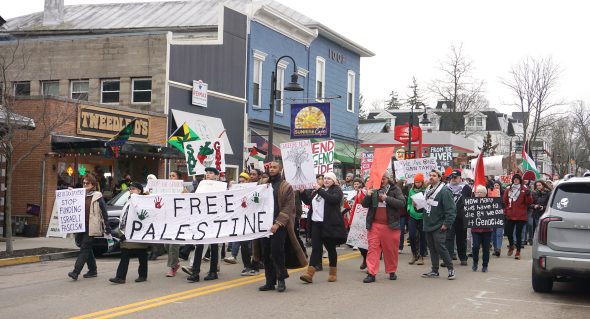
Newly formed group YS UPROAR staged a pro-Palestinian march throughout Yellow Springs on Saturday, Jan. 27. (Photo by Reilly Dixon)
Editorial | Ceasefire now
- Published: February 5, 2024
The government of South Africa is making the case at the International Court of Justice that Israel has committed genocide — the intentional killing of swaths of people from a specific nation or ethnic group.
The News agrees.
We believe we are witnessing the horrors of genocide, that it is wrong, and that we, as reporters — no matter how small we are — must stand on the side of truth in relaying this tragic reality.
On the News’ publication day, Friday, Jan. 26, Antioch College, and Yellow Springs High School students, along with the organization YS Uproar, will participate in a walkout and sign making event, in preparation for a march this Saturday, Jan. 27, at 2 p.m. beginning outside the Wellness Center. The purpose of the march is to demand that the U.S. government and Village Council call for a “ceasefire and end to the violence perpetuated by the Israeli military,” according to a Jan. 19 letter submitted to us from Lark Orbe.
Some members of the News will be there in support of this effort.
For several weeks, News staff have been engaged in discussions about our responsibility in speaking out about the genocide that is occurring in Gaza against the Palestinian people, at the behest of Benjamin Netanyahu’s Israeli government, with diplomatic, economic and military support from the United States. This country has provided Israel with weapons of mass destruction utilized to kill innocent people. Since Oct. 7, 2023, over 25,000 Palestinians have lost their lives, 70% of them women and children. Around 1,200 Israeli civilians were also killed in an initial horrific attack on the country by Hamas.
Our internal conversations have ranged from our ability, or lack thereof, to understand the conflict from an historical framework — as well as one that considers the current geopolitical landscape as it relates to our government’s foreign policy agenda in the Middle East. For instance, what does it mean that only 12 countries, including the United States, view Hamas as a terrorist organization instead of a political organization with a military arm? Or that Israel’s demographics include Arabs and Christians? Why is this war getting more attention than the Sudanese civil war, the humanitarian crises in Yemen and the Democratic Republic of Congo?
We vehemently condemn the killing of innocent people caught in the violence between Hamas and Israel’s military campaign, but it’s critical to distinguish between Israel, the country and government, and people from all over the globe who are Jewish. In public discussions around the conflict, this distinction has not always been made, and the atmosphere around these discussions has been polarized.
Consider the outrageous treatment of the only Palestinian representative in the U.S. House of Representatives, Rashida Tlaib, who was censured after insisting that the U.S. recognize the humanity of Palestinians. Consider also the take-down of two highly competent former Ivy League college presidents — University of Pennsylvania’s Liz Magill and Harvard’s Claudine Gay — who fell into political traps that required taking a moral stand and not misguided legalese related to free speech; both resigned amid accusations of antisemitism. Consider that Gay was subjected to extremism in the form of death threats and racist slurs on her way out.
Certainly, college campuses should not and cannot tolerate antisemitism any more than they should tolerate the swatting of college students who support the Palestinian cause.
This is just a drop in the bucket of the ongoing discourse. All the while, people are continuing to die by bombs still dropping on their homes, universities and hospitals, even as this is being written.
Past News editors have been resolute in speaking out against injustices that have occurred in recent history, including the Vietnam War, the first war with Iraq and support for the civil rights movement, as evidenced by the numerous editorials housed in the News’ archives. These world events have local impact; we are, at the end of the day, all global citizens. The violence and killing in Gaza are no exception, and we particularly grieve for the folks in our community with strong Israeli and Palestinian ties, who are heartbroken by what is occurring.
We also note that one of the costs of relaying this truth is the killing of journalists. Officially, 76 journalists — mostly Palestinian — have lost their lives since the conflict began on Oct. 7, but that number may be much higher.
One journalist who has had to bear more than his share of unbearable loss is Al Jazeera bureau chief Wael Al Dahdouh, whose son, Al Jazeera correspondent and cameraman Hamza Al Dahdouh, 27, was killed on Jan. 7. The elder had previously lost his mother, another son and other relatives when their home was bombed, and also survived life-threatening injuries himself. In an interview with former MSNBC anchor Ayman Mohyeldin, Al Dahdouh lamented that he felt abandoned by the world’s journalists.
We are just a speck in the world’s roll call of media organizations, but if there is anything we can do to support Al Dahdouh, we will do what we can to stand in solidarity and support of the important and dangerous work he is doing to provide information for the world.
There are simply no words that could possibly honor the personal loss he’s endured.
The Yellow Springs News encourages respectful discussion of this article.
You must login to post a comment.
Don't have a login? Register for a free YSNews.com account.











No comments yet for this article.